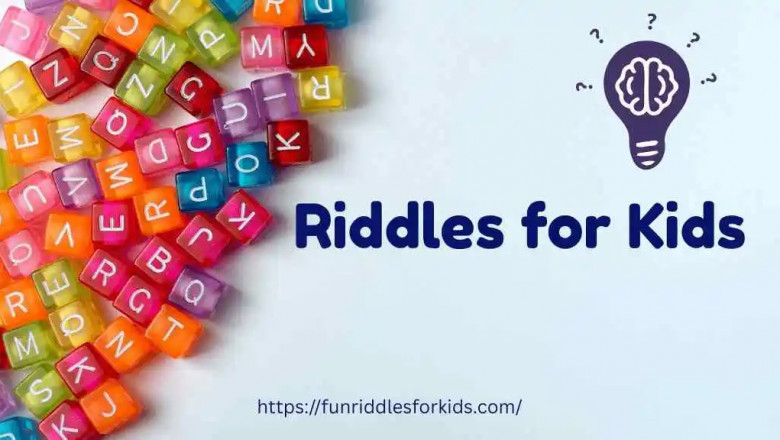views
Riddles aren’t just silly jokes—they’re mini brain workouts disguised as fun! Especially for children, funny riddles provide a fantastic way to boost critical thinking, improve language development, and encourage creative problem-solving—all while making them giggle.
Whether you're a parent, teacher, or caregiver, riddles for kids are a must-have tool to keep young minds sharp and engaged. And when they’re funny? That’s the perfect combo of education and entertainment!
🧠 Why Are Funny Riddles Important for Kids?
Funny riddles are more than just laughter—they’re powerful learning tools. Here's why they matter:
-
✅ Boost vocabulary and comprehension
-
✅ Develop logic and reasoning skills
-
✅ Enhance memory retention
-
✅ Encourage active listening and communication
-
✅ Promote a fun learning environment
🎉 25 Hilariously Funny Riddles for Kids
Here’s a curated list of kid-friendly, laugh-out-loud riddles perfect for classroom activities, road trips, birthday parties, or bedtime giggles.
🔍 Simple and Silly Riddles
-
What has hands but can’t clap?
👉 A clock! -
Why did the student eat his homework?
👉 Because the teacher said it was a piece of cake! -
What do you call a bear with no teeth?
👉 A gummy bear! -
What has a face and two hands but no arms or legs?
👉 A clock! -
Why can’t your nose be 12 inches long?
👉 Because then it would be a foot!
🥸 Animal-Themed Riddles
-
Why did the cow cross the road?
👉 To get to the udder side! -
What do you call an alligator in a vest?
👉 An investigator! -
What animal can you always find at a baseball game?
👉 A bat! -
Why do seagulls fly over the sea?
👉 Because if they flew over the bay, they’d be bagels! -
What do you get when you cross a snowman and a dog?
👉 Frostbite!
🤯 Tricky but Funny Riddles
-
What gets wetter the more it dries?
👉 A towel! -
What comes once in a minute, twice in a moment, but never in a thousand years?
👉 The letter M! -
I’m tall when I’m young, and I’m short when I’m old. What am I?
👉 A candle! -
What begins with T, ends with T, and has T in it?
👉 A teapot! -
What goes up but never comes down?
👉 Your age!
🍭 Food-Themed Riddles for Kids
-
What kind of room has no doors or windows?
👉 A mushroom! -
Why did the banana go to the doctor?
👉 Because it wasn’t peeling well! -
What do you call cheese that’s not yours?
👉 Nacho cheese! -
Why did the cookie go to the hospital?
👉 Because it felt crummy! -
What fruit do twins love?
👉 Pears!
🛴 Everyday Objects with a Twist
-
What can travel around the world while staying in one corner?
👉 A stamp! -
What kind of tree fits in your hand?
👉 A palm tree! -
What has many keys but can’t open a single lock?
👉 A piano! -
What has legs but doesn’t walk?
👉 A table! -
What’s full of holes but still holds water?
👉 A sponge!
🧩 How to Use Funny Riddles Effectively
Here are some creative ways to incorporate funny riddles into your child’s daily routine:
-
📚 Morning Brain Boost: Kickstart the day with a morning riddle at breakfast.
-
🚌 Travel Fun: Use riddles during road trips to make the ride more exciting.
-
🎉 Party Games: Add riddles to birthday party games or treasure hunts.
-
📖 Classroom Activities: Use them as warm-ups before lessons to energize the class.
-
🌙 Bedtime Fun: Wind down with a riddle instead of screen time.
🧒 Who Benefits from Funny Riddles?
Funny riddles are suitable for:
-
Preschoolers (ages 3–5)
-
Kindergarten kids (ages 5–6)
-
Elementary school children (ages 6–10)
They help build emotional intelligence, patience, and creativity—all essential developmental skills.
💡 Fun Fact
According to child development experts, solving word puzzles like riddles increases neural connections in the brain, leading to better cognitive performance and academic success. Humor also plays a crucial role in reducing stress and improving mood in kids!
📌 Final Thoughts
Funny riddles for kids are a delightful blend of entertainment and education. They encourage thinking outside the box, help build language skills, and foster a sense of humor in children—all while creating joyful memories.
So next time you’re looking for a screen-free, educational activity for your little one, try asking:
👉 “Why did the kid bring a ladder to school?”
✨ Because he wanted to go to high school!
📝 Frequently Asked Questions (FAQs)
Q: What age are funny riddles suitable for?
A: Funny riddles can be enjoyed by kids aged 3 and up, with age-appropriate wording and humor.
Q: Are funny riddles educational?
A: Yes! They help with language skills, memory, reasoning, and communication.
Q: Can I use riddles in school classrooms?
A: Absolutely. They make excellent warm-up exercises and ice-breakers.














Comments
0 comment